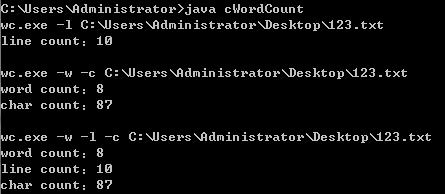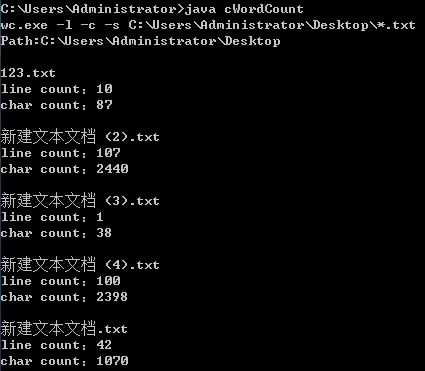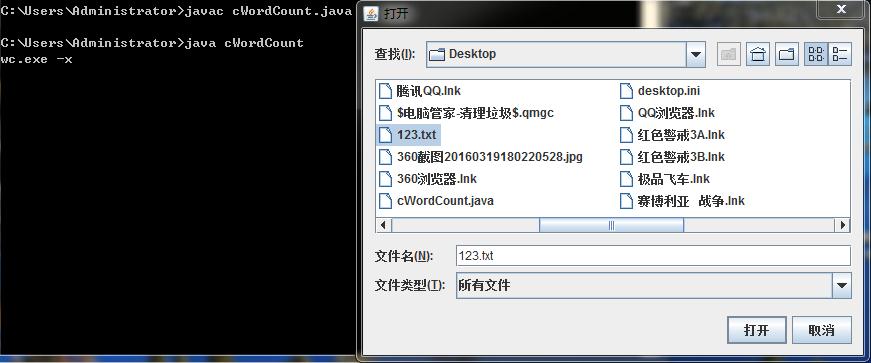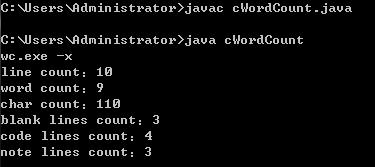软件工程第三个程序:“WC项目” —— 文件信息统计(Word Count ) 命令行程序
格式:wc.exe [parameter][filename]
在[parameter]中,用户通过输入参数与程序交互,需实现的功能如下:
1、基本功能
支持 -c 统计文件字符数
支持 -w 统计文件单词数
支持 -l 统计文件总行数
2、拓展功能
支持 -a 返回高级选项(代码行 空行 注释行)
支持 -s 递归处理符合条件的文件
3、高级功能
支持 -x 程序以图形界面与用户交互
[filename] 是待处理文件名。
基本功能
主函数里用String字符串接收用户输入,并分解成参数数组 和 文件地址。
编写BaseCount()函数实现对文件的读操作,逐行统计统计字符数,并记录行数,同时使用StringBuffer类记录文件中所有的信息。最后一起统计 词数,避免在逐行计词时,把标点计为一词。
编写Response()函数根据用户输入的参数输出信息,这里程序不管用户输入的参数是什么,都在读取文件的时候把所有信息都记录下来并保存,用户输入的参数里有什么输出什么。
private static void BaseCount() { linecount = 0; wordcount = 0; charcount = 0; File file = new File(sFilename); if(file.exists()) { try { FileInputStream fis = new FileInputStream(file); InputStreamReader isr = new InputStreamReader(fis,"UTF-8"); BufferedReader br = new BufferedReader(isr); String line = ""; StringBuffer sb = new StringBuffer(); while ((line = br.readLine()) != null) { linecount++; sb.append(line); charcount += line.length(); } wordcount = sb.toString().split("\s+").length;// br.close(); isr.close(); fis.close(); } catch (FileNotFoundException e) { e.printStackTrace(); } catch (UnsupportedEncodingException e) { // TODO Auto-generated catch block e.printStackTrace(); } catch (IOException e) { // TODO Auto-generated catch block e.printStackTrace(); } } }
Java编写的程序 可以在cmd.exe里调用运行,提升一下bigger,输出的结果如图:

桌面上123.txt的内容如下:
using System;
namespace OneProgram
{
class Program
{
Console.Write("wc.exe");
}
}
拓展功能
参数 -s 的使用效果为:参数中带有“-s”,文件的名称为“*.XXX”,输出所有的.XXX文件的信息。
相当于先找到所有该目录下的文件,然后判断文件的类型,再把符合的文件进行文件信息统计,最后输出。
那就直接再写一个ResponseforS()函数来专门处理参数带“-s”的命令,首先记录其他参数,分离文件路径 与 文件类型;定义字符串数组记录文件路径下的所有文件名;与用户输入的文件类型比较,对符合的文件进行文件信息统计,输出;循环 比较 输出;
private static void ResponseforS() { // TODO Auto-generated method stub String path = sFilename.substring(0,sFilename.indexOf("*")-1); String type = sFilename.substring(sFilename.indexOf("*")+1,sFilename.length()); System.out.print("Path:"); System.out.println(path + " "); File dir = new File(path); if(dir.isDirectory()) { File next[] = dir.listFiles(); for (int i = 0; i < next.length; i++) { if( ! next[i].isDirectory()) { //System.out.println(next[i].getName()); if(next[i].getName() .substring(next[i].getName().indexOf(".") ,next[i].getName().length()) .equals(type)) { System.out.println(next[i].getName()); sFilename = path + "\" + next[i].getName(); BaseCount(); Response(); } } } } else{ System.out.println("path error"); } }
输出的结果如图:

参数 -a 的使用效果为:参数中带有“-a”,输出文件的空行、码行、注释行的统计信息。
该功能与基本功能类似,直接在BaseCount()函数里改写,函数名改为BaseAndAdvanceCount()。
在程序对文件读行的时候判断该行的长度,判断是否为空行,判断是否有连续的“/”,来判断是否为注释行,如果既不是空行 也不是注释行,则为代码行。
private static void BaseAndAdvanceCount() { linecount = 0; wordcount = 0; charcount = 0; nullLinecount = 0; codeLinecount = 0; noteLinecount = 0; File file = new File(sFilename); if (file.exists()) { try { FileInputStream fis = new FileInputStream(file); InputStreamReader isr = new InputStreamReader(fis, "UTF-8"); BufferedReader br = new BufferedReader(isr); String line = ""; StringBuffer sb = new StringBuffer(); while ((line = br.readLine()) != null) { linecount++; sb.append(line); charcount += line.length(); line = line.trim(); // 空白行 if (line == "" || line.length() <= 1) { nullLinecount++; continue; } // 注释行 int a = line.indexOf("/"); int b = line.substring(a+1).indexOf("/"); if ( b == 0 ) { noteLinecount++; continue; } // 代码行 codeLinecount++; } wordcount = sb.toString().split("\s+").length;// br.close(); isr.close(); fis.close(); } catch (FileNotFoundException e) { e.printStackTrace(); } catch (UnsupportedEncodingException e) { e.printStackTrace(); } catch (IOException e) { e.printStackTrace(); } } else { System.out.println("path error"); } }
输出的结果如图:

桌面上123.txt里的内容改为:
using System;
namespace OneProgram
{//
//
class Program
{
Console.Write("wc.exe");
}
}//without copyright
高级功能
参数 -x 的使用效果为:只输入“-x”,弹出文件选择对话框,选择文件后输出该文件的所有信息。
这里仍然为参数 “-x” 建立一个独立的函数ResponseforX(),创建显示一个文件选择对话框,选中某个文件后返回该文件的绝对路径,交给BaseAndAdvanceCount()函数 与 Response()函数。输出所有信息。
private static void ResponseforX() { // TODO Auto-generated method stub flag_x = 1; chooser = new JFileChooser(); int value = chooser.showOpenDialog(null); if (value == JFileChooser.APPROVE_OPTION) { File file = chooser.getSelectedFile(); sFilename = file.getAbsolutePath(); BaseAndAdvanceCount(); Response(); } }
操作过程与输出的结果如图:


桌面上123.txt里的内容没变。
至此所有的功能已基本实现 :)
所有的代码已上传至Coding,Coding:https://coding.net/u/Mr_winter/p/ESE03/git
>>>追加
问题1.参数的顺序是固定的么?比如 -c 和 -w 的顺序是否可以交换?
回答:可以的,粘出Response()函数的部分代码如下
for (int i = 0; i < sParameter.length; i++) { if (sParameter[i].equals("-l")) { System.out.print("line count:"); System.out.println(linecount); } else if (sParameter[i].equals("-w")) { System.out.print("word count:"); System.out.println(wordcount); } else if (sParameter[i].equals("-c")) { System.out.print("char count:"); System.out.println(charcount); } else if (sParameter[i].equals("-a")) { System.out.print("blank lines count:"); System.out.println(nullLinecount); System.out.print("code lines count:"); System.out.println(codeLinecount); System.out.print("note lines count:"); System.out.println(noteLinecount); }
先输入 -c 就先输出 char count ;先输入 -w 就先输出 word count。:)
问题2.如果要想处理/* */ 这样的注释,该如何修改代码呢?
回答:改一下代码呗
private static void BaseAndAdvanceCount() { int flag_note = 0;// 为1时 说明程序正在读/* */中的内容 linecount = 0; wordcount = 0; charcount = 0; nullLinecount = 0; codeLinecount = 0; noteLinecount = 0; File file = new File(sFilename); if (file.exists()) { try { FileInputStream fis = new FileInputStream(file); InputStreamReader isr = new InputStreamReader(fis, "UTF-8"); BufferedReader br = new BufferedReader(isr); String line = ""; StringBuffer sb = new StringBuffer(); while ((line = br.readLine()) != null) { linecount++; sb.append(line); charcount += line.length(); // ++++++++++++++++++修改区域++++++++++++++++++++ line = line.trim(); if (flag_note == 0) { // 空白行 if (line == "" || line.length() <= 1) { nullLinecount++; continue; } // 注释行 int a = line.indexOf("/"); int b = line.substring(a + 1).indexOf("/"); if (b == 0) { noteLinecount++; continue; } else { int c = line.substring(a + 1).indexOf("*"); if (c == 0) { flag_note = 1; noteLinecount++; continue; } } // 代码行 codeLinecount++; } else { // 统计/* */的大小 int a = line.indexOf("*"); int b = line.substring(a + 1).indexOf("/"); if (b == 0) { noteLinecount++; flag_note = 0;// /* */结束,标志重新置0 } else { noteLinecount++; } } } // +++++++++++++++++++++++++++++++++++++++++++++++ wordcount = sb.toString().split("\s+").length;// br.close(); isr.close(); fis.close(); } catch (FileNotFoundException e) { e.printStackTrace(); } catch (UnsupportedEncodingException e) { e.printStackTrace(); } catch (IOException e) { e.printStackTrace(); } } else { System.out.println("path error"); } }
运行的结果让人很满意 :)

123.txt 中的内容为:
using System;
namespace OneProgram
{//
//
class Program
/* {
Console.Write("wc.exe");
}
}//without copyright*/
:)
J.X.Dinosaur